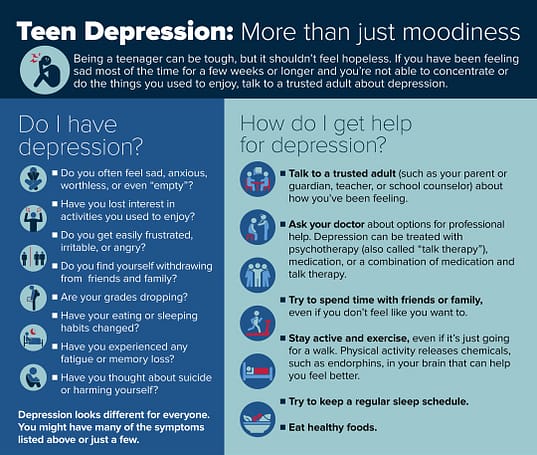As a parent, it can be heart-wrenching to see your teen struggle with depression. The teenage years are already filled with challenges—academic pressure, social dynamics, and self-discovery—but when depression is added to the mix, the experience can feel overwhelming. However, as a parent, your support plays a crucial role in helping your teen navigate this difficult time and take steps toward healing.
Understanding depression in teens, recognizing the signs, and knowing how to provide meaningful support can make all the difference. In this post, we’ll discuss how parents can best support their teen during their battle with depression.
Understanding Teen Depression
Teen depression is not simply a phase or a result of typical teenage mood swings. It’s a serious mental health condition that can affect every aspect of a teen’s life, from school performance to relationships to physical health. Depression can manifest differently in teens than it does in adults. While sadness, irritability, and lack of interest are common symptoms, depression in teens can also show up as changes in behavior, sleep disturbances, or even physical complaints like headaches or stomachaches.
Common signs of teen depression include:
• Persistent feelings of sadness, hopelessness, or worthlessness
• Withdrawal from friends and family
• Loss of interest in activities they once enjoyed
• Decline in academic performance or a lack of motivation
• Irritability or mood swings
• Changes in appetite or sleep patterns
• Engaging in risky behaviors (substance abuse, self-harm, etc.)
• Expressing thoughts of death or suicide
If you notice these signs in your teen, it’s important to take them seriously and take steps to offer support.
How Parents Can Support Their Teens Struggling with Depression
1. Recognize and Acknowledge Their Struggles
The first step in supporting your teen is acknowledging that depression is real and serious. It’s easy to fall into the trap of thinking that your teen should “snap out of it” or that their struggles will pass on their own, but depression doesn’t just go away without intervention. Be empathetic and avoid minimizing their feelings. Instead of saying things like “It’s just a phase” or “Other people have it worse,” listen and validate their emotions.
• What you can say: “I can see you’re going through a tough time right now, and I want to help you.”
2. Create a Safe and Supportive Environment
Teens often withdraw during times of depression, and it’s important to offer them a safe, non-judgmental space where they feel comfortable expressing themselves. Avoid reacting with frustration or anger if they shut you out. Instead, gently remind them that you’re there for them whenever they’re ready to talk.
• What you can do: Set aside time each day for a casual conversation or engage in activities your teen enjoys to help break down barriers.
3. Encourage Open Communication
It can be difficult for teens to open up about their emotions, especially when they’re struggling with depression. However, open communication is crucial for getting them the help they need. Be patient, listen attentively, and avoid interrupting or offering quick solutions. Simply being there and showing that you care can help your teen feel understood.
• What you can do: Ask gentle questions such as, “How are you feeling today?” or “Is there anything on your mind that you’d like to talk about?”
4. Encourage Professional Help
While your support is vital, it’s important to recognize that professional help may be necessary to address your teen’s depression. A licensed therapist, counselor, or psychiatrist can provide the tools and guidance your teen needs to manage their depression in a healthy way. Offering support in seeking treatment shows that you take their mental health seriously.
• What you can do: Offer to help find a therapist or counselor, and accompany them to their first appointment if they need support.
5. Promote Healthy Lifestyle Choices
Physical health and mental health are closely connected. Encouraging your teen to engage in healthy habits, like eating well, getting enough sleep, and exercising, can help alleviate some symptoms of depression. Encourage physical activities, such as going for walks, bike rides, or participating in sports they enjoy.
• What you can do: Cook healthy meals together, set up a regular sleep schedule, and invite your teen to join you in exercise or outdoor activities.
6. Set Realistic Expectations and Offer Support with Daily Tasks
Depression can make even the simplest tasks feel overwhelming. Teens may struggle with schoolwork, chores, or maintaining friendships. As a parent, it’s important to offer support without adding to the pressure. Help your teen set realistic goals and break larger tasks into smaller, manageable steps. Remind them that they don’t have to do everything at once.
• What you can do: Offer to help with homework or organize a daily schedule to provide structure and reduce feelings of overwhelm.
7. Watch for Warning Signs of Suicide
Suicidal thoughts can be a major concern in teens dealing with depression. If your teen talks about wanting to die or expresses hopelessness, it’s critical to take these statements seriously and seek immediate professional help. If you ever feel that your teen is in immediate danger, don’t hesitate to contact a crisis hotline or take them to the emergency room.
• What you can do: If you’re concerned about your teen’s safety, contact a mental health professional or emergency services immediately.
8. Take Care of Yourself
Supporting a teen with depression can be emotionally exhausting. It’s important to take care of your own mental health as well. Seek support from other parents, friends, or even a therapist to help manage the emotional strain. Remember that by taking care of yourself, you’ll be better able to care for your teen.
• What you can do: Practice self-care regularly—whether through exercise, meditation, hobbies, or spending time with loved ones.
Final Thoughts
Supporting a teen struggling with depression requires patience, understanding, and a willingness to be actively involved in their recovery. Although it may feel overwhelming at times, your involvement can make a significant difference in your teen’s ability to manage their depression. Encouraging open communication, seeking professional help, and fostering a supportive environment can empower your teen to navigate their mental health challenges and find a path to healing.
Remember, depression is treatable, and with your support, your teen can overcome these difficult times and emerge stronger. Don’t hesitate to seek help when needed—both for your teen and for yourself. You don’t have to go through this alone.






